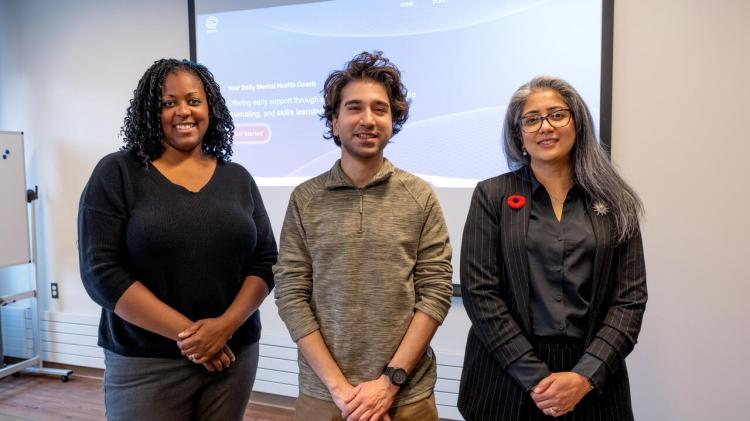A University of Waterloo student developed an AI-powered app to help people exhibiting early signs of a mental health condition.
Described as "your daily mental health coach," the app, Doro, offers 30-minute chat sessions where users can express their concerns and feelings about anything. From feeling overwhelmed with an assignment to self-esteem issues, the chatbot can suggest various cognitive and behavioural techniques commonly used by therapists like journaling, exposure or mindfulness.
"Doro can address any risk factors for mental health like stress, relationship challenges or loneliness to prevent any escalation," says co-creator Rastin Rassoli. "For example, if someone's schedule is stressful, Doro could help with planning."
The app sits at the cutting edge of computer science and psychology research. Rassoli's team built Doro by creating Large Language Models (LLMs) that were trained on publicly available therapy sessions. They also researched therapy techniques to address common conditions, like insomnia or anxiety.
"During the session, Doro will shift between these models. If Doro wants to probe the user, there's a LLM for that. Doro has different LLMs for delivering solutions like thought record or reattribution," Rassoli says.
With these interdisciplinary features, Doro can deliver accurate and efficient care, right at your fingertips.
During the first session, Doro will ask the user about their experience with mental health and other identity-based questions like age or gender identity. This helps the app accurately understand the user's needs.
For example, if someone is experiencing a panic attack, Doro may ask them to try some breathing exercises. It may also suggest an exercise used in dialectical behaviour therapy called grounding, where someone explains their surroundings based on the five senses, such as touch or smell. These techniques could help the user regulate their emotions and connect with the present, reducing the attack's intensity. Meanwhile, Doro will ask if they want to discuss their feelings or if they prefer different methods.
Rassoli was inspired to create Doro, after working at a mental health startup in 2022, where he helped create Joyi, a mobile game to help high school and university students manage their anxiety. Throughout his co-op work terms, he interviewed various students about their mental health challenges and was surprised to learn that there wasn't much support for people at the subclinical stage.
The subclinical stage refers to individuals who are facing problems that are affecting their mental well-being. However, it isn't serious enough for a diagnosis, preventing them from accessing important resources like medication.
"These individuals are showing early symptoms like daily anxiety, sleep disturbance or social withdrawal," Rassoli says. "All of these symptoms emerge very early, like weeks or months before the full mental health disorder manifests. Unfortunately, there's not much support for this stage and if you don't receive it as soon as possible, your mental health will worsen."
For the past year, Rassoli and his brother and co-creator Ramtin Rassoli have conducted clinical trials with students across Canada, receiving critical acclaim. However, Rassoli emphasizes that Doro is meant to supplement not replace therapy.
"Talking to someone for two hours doesn't magically solve all your problems you need ongoing support. So, we turned to Doro as a tool for pre- and post-therapy, since after therapy individuals may have some residual symptoms," Rassoli says. "Many therapists are using Doro as an adjunct tool because its techniques can help clients manage their symptoms. If Doro senses that the user's symptom is serious, it will immediately end the chat and tell them to seek help. We also have a built-in database that can refer them to an available therapist in their area or a helpline."
Recently, Doro was deployed at Waterloo's Campus Wellness and 30 mental health clinics in Ontario and Alberta. This breakthrough in student care was supported by Dr. Goldi Gill, the executive director of Campus Wellness.

From left to right: Melissa Strachan, associated director, Counselling Services, Rastin Rassoli, co-founder, Doro, and Dr. Goldi Gill, executive director, Campus Wellness.
"When Rastin approached me about Doro, I agreed with his vision. Some students are unsure what type of support they need. Sometimes they don't need counselling, they just need help with balancing their lifestyle. We have seen that some students may need one counselling session while others need multiple," Goldi says. "To have a supplementary support system that students can go to is such a brilliant idea. We're really excited for Waterloo students to have a product that's homegrown and can positively impact their lives."
"Doro is now part of our students' resource list, free of charge for a period of time."
Waterloo is known for helping students tackle challenges differently to unlock barriers and develop creative solutions. Notably, Rassoli has received support with Doro through Waterloo's Enterprise Co-op (E Co-op) program, which allows students to start a venture while earning co-op credit. He was also supported by Velocity, Waterloo's flagship incubator, and has participated in their pitch competition.
"Velocity has been coaching us since the beginning. Every week, our advisor connects us to different people or programs and makes sure we're on the right track. They have helped us understand our customers and market," Rassoli says.
Doro's latest version was launched in September 2024. It is currently available for use through their website, with plans to launch it in app stores soon.












